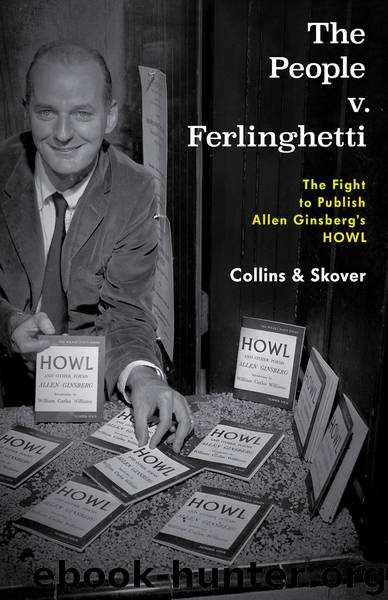The People v. Ferlinghetti by Ronald K. L. Collins & David M. Skover

Author:Ronald K. L. Collins & David M. Skover
Language: eng
Format: epub
ISBN: 9781538125908
Publisher: Rowman & Littlefield Publishers
Did the authors of the First Amendment actually strike that balance in their constitutional command to government? Perhaps. Then again, it is just as likely that Justice Black took poetic license, which is where Whitman and Ferlinghetti and their literary like come into play. The lesson that poets teach us is that the freedom vouchsafed by the First Amendment cannot be left to black letter lawyers and robed judges, important as they can be in safeguarding our liberties. If it is to realize its ideal, the law of the First Amendment must be rooted in the spirit of liberty, in the soil in which the seeds of dissent stir. Law and poetry, reason and romance—they came together in People v. Ferlinghetti in a mixture as unusual as it was essential.
Ferlinghetti, however, was no street-fighting starry-eyed radical, no Allen Ginsberg maniac, no Jack Kerouac hypochondriac. True, he hung with them, supported them, and published them. But he was also something they never were—a successful businessman. Strange portrayal of someone who has long had socialist blood in his veins. Make of it what one will, but remember this: Lawrence Ferlinghetti launched a profitable bookstore, started a successful publishing house, placed both in jeopardy in the Howl case, and in the process became an example (albeit a rare one) of a fearless businessman who stood firmly and proudly on his rights. It is easy to overlook the fact that Ferlinghetti’s stand could have gone south; he could have lost the case, his liberty, and his business. How many business people would follow his example?
To raise such a question is to point to the psyche of the poet, painter, publisher, and bookstore owner known as Lawrence Ferlinghetti—the calm rebel, the outspoken businessman, the spirited poet, the daring publisher, and the quiet bookstore owner who refused to silence the voices of his authors.
* * *
1855: In that year Walt Whitman first published his Leaves of Grass. He penned his poetic words, designed the cover and interior, and even “set some of the type for it in a Brooklyn printing office.” Poet, printer, and bookseller, too, Whitman came to be defined by his great work. Over time, Whitman refined and expanded it. One of the poems in that collection is titled “In Paths Untrodden.” It is as good as any a window into the mind of the man and his life view. Here is how it opens:
In paths untrodden,
In the growth by margins of pond-waters,
Escaped from the life that exhibits itself,
From all the standards hitherto publish’d, from the pleasures,
profits, conformities,
Which too long I was offering to feed my soul,
Clear to me now standards not yet publish’d, clear to me that
my soul
Download
This site does not store any files on its server. We only index and link to content provided by other sites. Please contact the content providers to delete copyright contents if any and email us, we'll remove relevant links or contents immediately.
| Mid Atlantic | Midwest |
| New England | South |
| West | Kindle Edition |
| Large Print | Audible Audiobook |
| Audio CD | Board Book |
Kitchen confidential by Anthony Bourdain(2329)
Dry by Augusten Burroughs(1694)
I Know Why the Caged Bird Sings by Maya Angelou(1598)
Kitchen Confidential by Anthony Bourdain(1538)
KITCHEN CONFIDENTIAL Adventures in the Culinary Underbelly by Anthony Bourdain(1455)
A Child Called It by Dave Pelzer(1413)
I know why the caged bird sings by Maya Angelou(1379)
A Heartbreaking Work of Staggering Genius by Dave Eggers(1372)
Taken by J. C. Owens(1286)
all by Unknown Author(1247)
Zeitoun by Dave Eggers(1230)
Extraordinary, Ordinary People by Condoleezza Rice(1212)
A Stolen Life by Dugard Jaycee(1163)
House of Darkness House of Light by Andrea Perron(1160)
The Farm in the Green Mountains by Alice Herdan-Zuckmayer(1145)
Law Man by Shon Hopwood(1144)
The Big Sea by Langston Hughes(1095)
The Year of Yes by Maria Headley(1072)
Dewey: the Small-Town Library Cat Who Touched the World by Vicki Myron & Bret Witter(1017)
